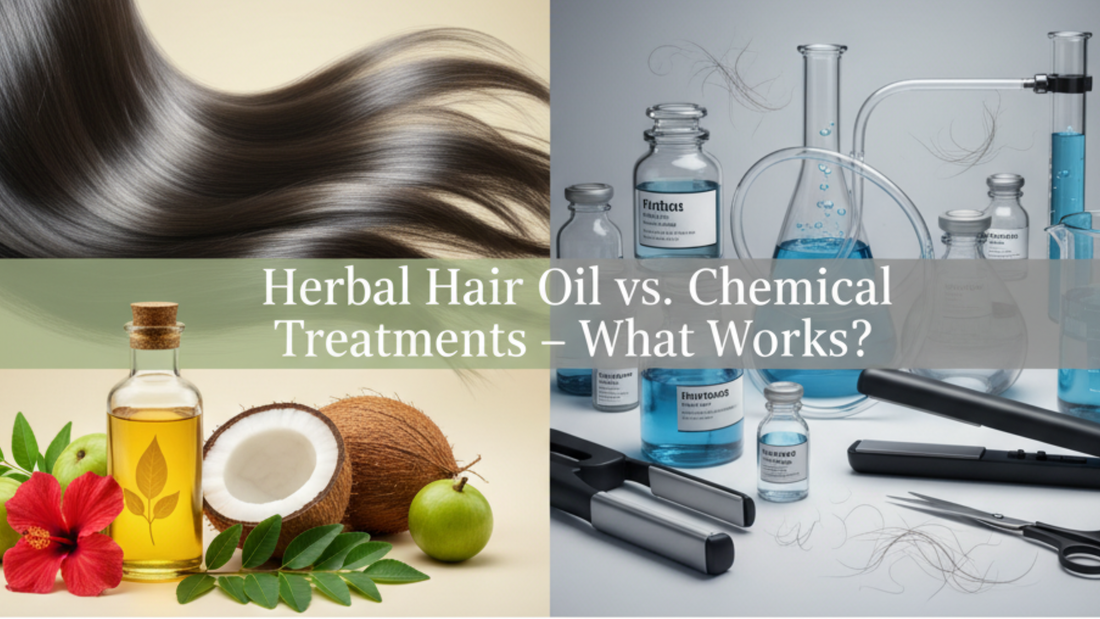
Herbal Hair Oil vs. Chemical Treatments: Which is Better for Healthy Hair?
Share
When it comes to hair care, most of us stand at a crossroads: should we trust age-old herbal hair oils or choose modern chemical treatments that promise instant results? Both have their importance but understanding how they work, their impact, and their long-term effects can help you make the best decision for your hair’s health and strength.

What’s in Your Bottle?
Herbal Hair Oils – Natural Nourishment from Roots to Tips
Traditional herbal oils are typically blends of natural base oils like coconut, sesame, or almond, infused with herbs such as Phyllanthus emblica (Amla), Azadirachta indica (Neem), Eclipta prostrata (Bhringraj), hibiscus, and fenugreek.
These Ayurvedic ingredients have been trusted for centuries to nourish the scalp, strengthen hair roots, and prevent hair fall:
- Amla (Indian gooseberry) is rich in Vitamin C and antioxidants...
- Neem has antibacterial properties that keep the scalp healthy and free from dandruff.
- Bhringraj, often called the "king of herbs for hair", is believed to promote hair growth and restore shine.
Most herbal oils are free from synthetic additives, making them gentle on the scalp and suitable for regular use.
Chemical Treatments – Quick Fix or Long-Term Damage?
Chemical treatments include hair smoothing, straightening, serums, and deep conditioners that contain silicones, sulphates, parabens, and sometimes harsh bleaching agents. These products can deliver immediate visible results such as shiny, frizz-free, manageable hair in just one salon visit.
But there’s a trade-off. Many of these treatments alter the natural structure of your hair, and over time, repeated chemical exposure can weaken hair shafts, cause dryness, increase breakage, and lead to long-term damage.
Why Herbal Oils Are Good for Hair Health
Switching to herbal oils isn’t just about tradition. Regular scalp massages with herbal oils allow active herbal compounds to penetrate deep into the scalp, improve blood circulation, and nourish hair follicles from the roots.
Benefits of regular oiling:
- Reduces hair fall and breakage.
- Controls dandruff and soothes itchy scalp.
- Delays premature greying.
- Strengthens roots and improves natural shine.
Unlike chemical treatments that give only a surface-level cosmetic effect, herbal oils work at a deeper and more restorative level to support hair health for the long run.
When to Use Chemical Treatments and How to Minimize Damage
Occasional Styling vs. Regular Use
Not all chemical treatments are harmful when used wisely. If you’re dealing with extreme frizz or need a polished look for a special occasion, a smoothing treatment or serum can be a helpful short-term solution. The key is moderation, and these should not become part of your daily hair care routine.
Choosing Milder Formulas
If you choose to use chemical products, select those that are sulphate-free and paraben-free, and ideally enriched with natural extracts. Always follow up with a nourishing hair care regimen that includes herbal oil massages to replenish moisture and protect your hair from long-term damage.
The Best Hair Care Approach: Balance is Key
You don’t need to completely abandon modern styling or stick only to traditional remedies. A balanced approach can give you the best of both worlds:
- Use herbal oils regularly to keep hair strong and healthy.
- Use mild chemical treatments occasionally for styling.
- Listen to your hair. If it feels dry or brittle, cut back on chemicals and restore nourishment through natural care.
Quick Hair Care Tips for Healthy Hair
- Massage herbal oil into your scalp twice a week for best results.
- Leave the oil overnight or at least for one hour before washing. Avoid leaving it for more than a day to prevent dust accumulation.
- Use lukewarm water and a mild herbal shampoo to wash your hair.
- Trim your hair regularly to prevent split ends and maintain healthy growth.
- Choose hair care products free from sulphates and parabens.
Final Thoughts – Natural Care Wins in the Long Run
In the debate of herbal hair oil vs. chemical treatments, herbal oils stand out for their long-term benefits. While chemical treatments can help you achieve a sleek look temporarily, herbal oils work at the root level, protecting your hair over time.
Remember a smart hair care routine isn’t about extremes but about the balance. Nourish regularly with nature, style occasionally with care, and your hair will thank you in the years to come.
Looking for authentic herbal hair oils?
Explore the Jindal Herbals range, crafted with traditional Ayurvedic herbs for long-term hair health
Looking for authentic herbal hair oils?
Explore the Jindal Herbals range, crafted with traditional Ayurvedic herbs for long-term hair health
